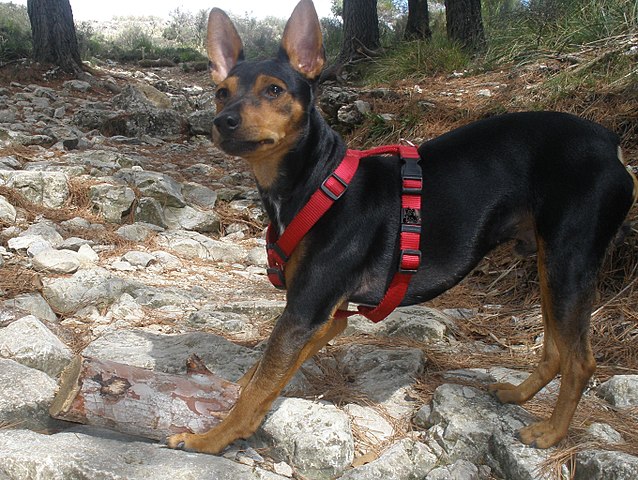The Majorca Ratter, also known as the Ca Rater Mallorquí, is a relative of the similarly appearing Ratenero Valenciano. This terrier has been overseen by its breed club in Spain since 1990. It is an extremely rare breed not yet recognized by the FCI (nor anywhere in the United States), and only recognized by Spain’s Ministry of Agriculture and Fishing. The breed was created roughly 160 years ago to hunt both rabbit and rats, and like all terriers is tenacious and brave. Along with their hunting talents, members of the breed are said to make excellent pets as well as great watchdogs! While super rare in most parts of the world, they are somewhat popular in the island in which they were created.
Majorca Ratters are affectionate little dogs and very loyal to their owners. They enjoy cuddling and can form deep bonds in which they seem to become very aware of their owner’s emotions. However they tend to be rather anxious in general and can be prone to snapping when frightened. Early socialization is a must! Owners must also be careful keeping them around cats or other small animals as they can be prone to chasing – understandable when one remembers they were designed to hunt small furry creatures.
The Majorca Ratter is an active dog and needs daily exercise – both physically as well as mentally. This said, the breed is tiny and a little bit of exercise can go a long way. One need only have a small fenced yard in order for him to race around off-lead and burn off some steam. Because of his prey drive and his tendency to wander off in search of something fun to chase, he should be kept inside a fence or on a leash when out in public.
The Majorca Ratter is intelligent and enjoys learning. Although he tends to be somewhat independent, with enough encouragement and a positive attitude, an owner can make training fun for him! Training him in obedience or agility is an excellent way to strengthen the bond between owner and dog. Remember that this terrier is surprisingly sensitive and he doesn’t take kindly to harsh treatment.
The Majorca Ratter prefers to live in a place where someone will be home most of the time as he is very social towards his own family. He doesn’t do well when left alone for long stretches of the day and isn’t normally the type of dog that can be brought to the office with his nervous temperament either. He can live in an apartment however, as long as he is given enough attention and companionship from “his person”.
Majorca Ratters are known for their loud and deep barks, which makes them sound like much bigger dogs than they actually are. Of course, if an intruder were to enter the home they are too small to do any actual damage, but they do make for a good alarm system! Unlike many of the smaller “alarm breeds”, the Majorca doesn’t tend to get too carried away with his voice and can be a quieter choice for those that prefer tiny dogs. Although he is somewhat territorial and will bark when someone approaches, he doesn’t normally just bark to hear his own voice.
Majorca Ratters have short, smooth coats which require very little grooming and shed very minimally. Colors include black & tan, brown & tan, black tricolor, and brown tricolor. Having been created and adapted to a warm climate, they do best in warm environments although can live in a colder climate if given jackets and a heated house! Other physical characteristics include pricked ears and frequently no tail – a trait which is either man-made (docked) or one in which the puppy is born with.

Photo By Bertet
